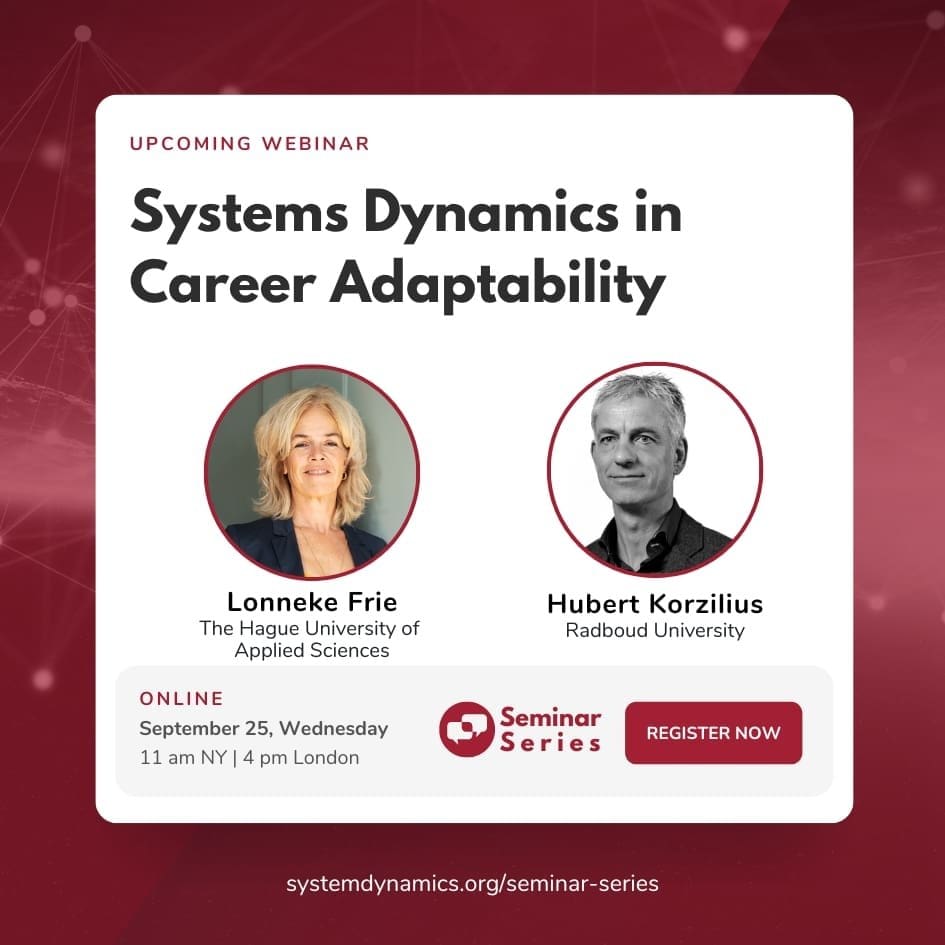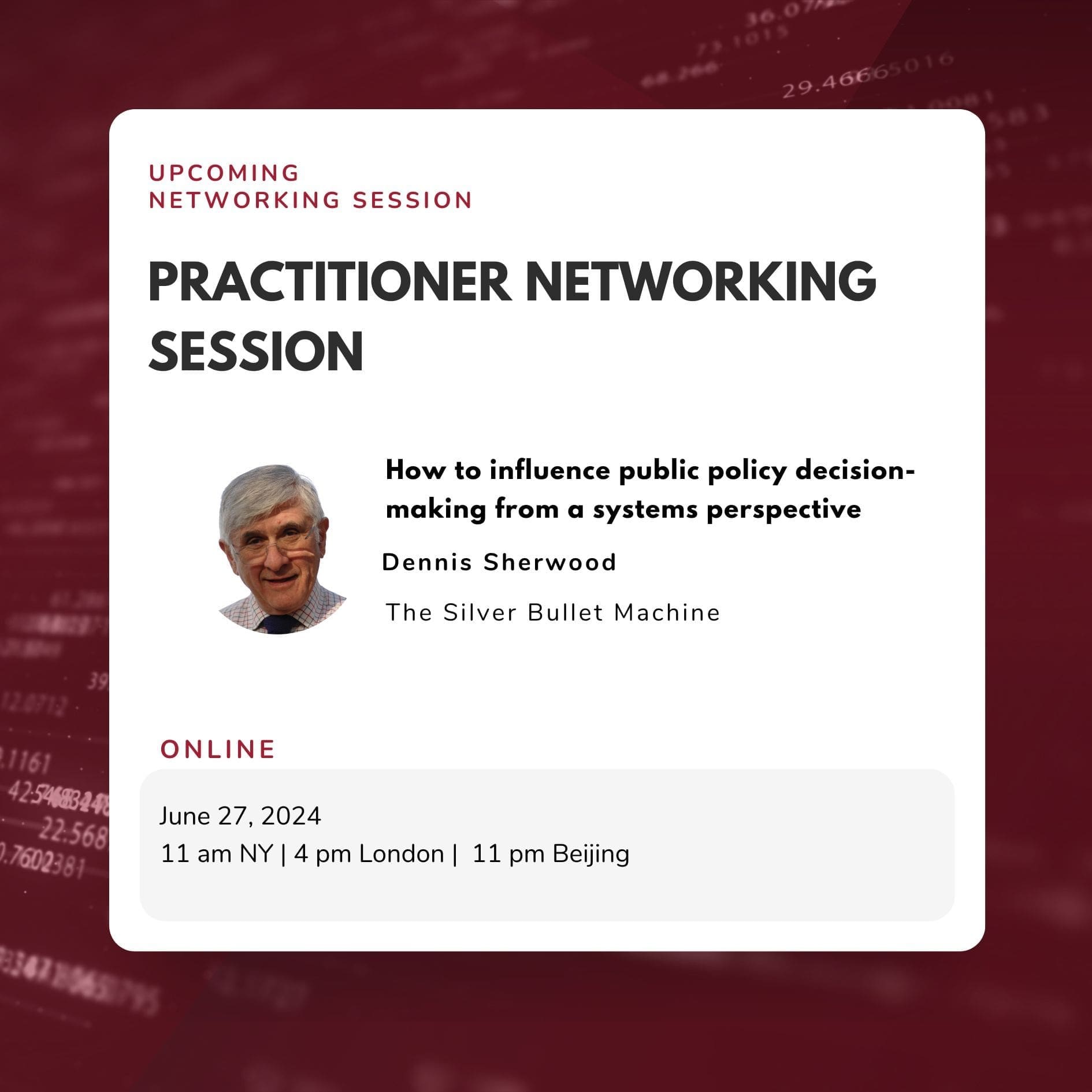Systems Dynamics in Career Adaptability
September 25, 2024 at 11 am New York | 4 pm London | 11 pm Beijing | Time Converter
In today’s rapidly changing job market, employees must continuously adapt to new expertise needs, both within their specific roles and across organizational boundaries. Traditional research has often failed to capture the true nature of this constant adaptation, focusing instead on linear development and isolated adaptive responses. Our webinar explores how a Systems Dynamics perspective can reveal the intricate interplay of intra-individual and social adaptation processes that sustain employability throughout a career. Lonneke Frie and Hubert Korzilius will share findings from an extensive literature review and practical insights from HR/D professionals, leaders, and career counselors, aiming to develop a comprehensive dynamic process model of adaptive expertise, or “flexpertise”.
Learning Outcomes:
- Understand the limitations of traditional linear approaches to expertise development and the importance of a dynamic systems perspective.
- Explore how intra-individual and social adaptation processes are interconnected, influence the work environment, and vice versa.
- Learn to apply the concept of “flexpertise” to personal career development and organizational Human Capital challenges.
Target Audience:
This webinar is designed for HR professionals, organizational leaders, career counselors, change managers, and researchers interested in employee development, career adaptability, and Systems Dynamics. It is also suitable for anyone looking to enhance their understanding of how you can renew your own expertise in a rapidly changing work environment.
Presenters:
Hubert Korzilius is associate professor of Research Methodology at the Institute for Management Research of the Radboud University, Nijmegen, the Netherlands. He is involved as a lecturer in the European Master in System Dynamics. His current research interests are: Research methodology, method development, quantitative and qualitative modeling, cross-cultural management, dynamic decision making, system dynamics, and resilience in complex systems. He has published books and book chapters and in scientific journals, among others in Applied Psychology: An International Review, European Journal of Operational Research, Food Policy, International Journal of Management Reviews, Nature Communications Earth & Environment, International Journal of Intercultural Relations, Social Networks, and System Dynamics Review.
Lonneke Frie PhD is senior researcher at the Research group Sustainable Talent Development at the Hague University of Applied Sciences, and affiliated to the Institute for Management Research of Radboud University. Besides, she applies her research insights to her evidence-based consultancy practice. Her current research focusses on the role of leaders in fostering flexpertise, and how flexpertise can foster sustainability transitions.
Publications on flexpertise:
Frie, L. S., Potting, K. C. J. M., Sjoer, E., Van der Heijden, B. I. J. M., & Korzilius, H. P. L. M. (2019). How flexperts deal with changing expertise demands: A qualitative study into the processes of expertise renewal. Human Resource Development Quarterly, 30, 61-79. doi.org/10.1002/hrdq.21335
Frie, L. S., Korzilius, H. P. L. M., Dobbinga, S., Van der Heijden, B. I. J. M., & Sjoer, E. (2024). Meeting new expertise needs throughout careers: A group model building approach in the field of HR/D. Human Resource Development Quarterly. https://doi.org/10.1002/hrdq.21544
Frie, L., Sjoer, E., Van der Heijden, B., & Korzilius, H. (2024). Fostering career sustainability: Renewal bundles of HR/D Practices for flexpertise development. In T. S. Rocco, M. L. Morris, & R. Poell (Eds.), The Sage Handbook of Human Resource Development. Sage.
Frie, L. S., Van der Heijden, B. I., Korzilius, H. P., & Sjoer, E. (2024). How workers meet new expertise needs throughout their careers: An integrative review revealing a dynamic process model of flexpertise. International Journal of Management Reviews. https://doi.org/10.1111/ijmr.12362
Marketing Roundtable: Evaluating and Evolving Our Communication Efforts
September 12 at 11 am NY | 4 pm London | 11 pm Beijing | Time Converter
Decarbonization of Student Transportation via Electric School Bus Transition
June 25 at 2 pm NY | 7 pm London | 2 am (next day) Beijing | Time Converter
Combating global climate change is frequently carried out at the local level, and decarbonization of Student Transportation is one such example. Transitioning to Electric School Buses, and other transportation modes, has barriers and motivators for adoption that range across Energy, Economics, Transportation, Health, and Education This seminar solicits cross Special Interest Group (SIG) 15 minute presentations on perspectives on how System Thinking and System Dynamics can contribute to the decarbonization effort and the facets of it.Joe Londa, Environmental SIG Leader, will give a presentation on the New York State mandated transition to Electric School Buses by 2035 and the outcome from a Student based project to build a generic transition model that creates transition scenarios. In addition, he will show a Storytelling System Dynamic Model that gives the holistic perspective. Other presentations will be announced as we get committed speakers.The seminar will close with a 20 minute discussion on how System Dynamics and the Society can contribute to achieving this decarbonization.
About the presenter
After a 40 year career in technology focused on developing systems I have retired and opened a fossil fuel free EcoLodge and volunteer to assist my community and school district reduce Greenhouse Gas Emissions. I also act as the Environmental SIG Leader.




